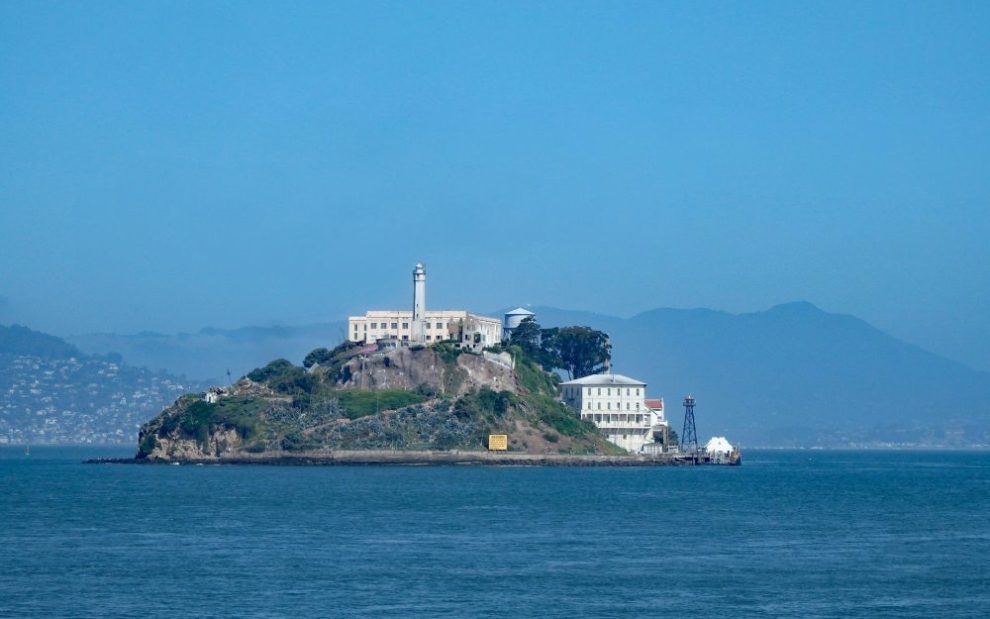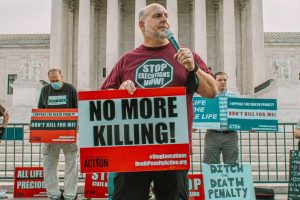Forty-one years ago, I joined the Pinellas County Sheriff’s Department, located in the Tampa Bay area of Florida. As a first-generation college student from a working-class family, I needed money to pay for my undergraduate studies, so I worked in the jail, which today has over 1000 personnel and an average daily population of 3000 inmates in its minimum, medium, and maximum facilities.
For four difficult years I worked in maximum security. While I sometimes dodged—not always successfully—fists, cups of urine, and excrement, I heard some of the foulest insults and swear words also thrown in my direction. I encountered not only hostility but also hopelessness. Some inmates were friendly and kind to me, though. And I was educated through this experience as much as I was by my classes at college, although the latter provided a much-needed respite as well as a source of hope for my future.
On the basis of that real-life education, as well as my education in Catholic theology, I reject the current administration’s plans to incarcerate migrants and refugees in brutal facilities modelled after the notorious maximum-security prison Alcatraz.
Earlier this year, President Donald J. Trump announced on Truth Social, “I am directing the Bureau of Prisons, together with the Department of Justice, FBI, and Homeland Security, to reopen a substantially enlarged and rebuilt ALCATRAZ, to house America’s most ruthless and violent offenders.” The prison, closed in 1963 by then-U.S. Attorney General Robert F. Kennedy, has been a popular museum administered by the National Park Service since 1972.
Although reopening the penitentiary seems unlikely, since it is small and doing so would be expensive, other “Alcatrazes” are popping up or planned. In addition to “Alligator Alcatraz,” which a federal appeals court has allowed to resume operations after a lower court ordered a halt to it, Florida governor Ron DeSantis has announced plans to open a similar center, called “Deportation Depot,” near Jacksonville, Florida. Plus, additional facilities to hold immigrants detained by Immigration and Customs Enforcement (ICE) officers, often wearing masks, are in the works in South Carolina and other states.
One of the things I learned first-hand when I worked in the jail was how entrenched racism is in the U.S. criminal justice system—in the disproportionate number of persons of color among the incarcerated, as well as in the racist attitudes and actions of some (not all) of my fellow officers. I remember feeling uncomfortable during roll call one night when an officer proudly showed us a thank-you note and flag he received from the government of South Africa for his support of its policy (at the time) of apartheid.
At the same time, though, one of my lieutenants gave me The Gulag Archipelago by Soviet and Russian dissident Aleksandr Solzhenitsyn, because he knew I was studying political science, with particular attention to authoritarian regimes and totalitarianism. Occasionally an inmate would compare the jail to a gulag or concentration camp, and I would recoil at the very suggestion. The jail was not even close to resembling a Nazi concentration camp or a Soviet-era gulag, and I couldn’t imagine anything like the internment camps of Japanese Americans happening in the United States again.
Yet here we are. Alligator Alcatraz and these other detention and deportation facilities are neither a jail, where arrested persons who are innocent until proven guilty await trial, nor a prison, where convicted persons are sent after their trial. They are more like a concentration or internment camp where persons are detained due to their nationality or ethnicity—and, regardless of whether they have criminal convictions or, if they do (and not all do), whether these are serious (attempted murder) or minor (traffic violations). Alligator Alcatraz’s tents and cages, especially when exposed to severe weather, must be punishingly brutal for these detainees, unlike for inmates in a temperature-controlled jail or prison.
As for those who are working in these new facilities, I worry about their training and qualifications. The staff at Alligator Alcatraz includes about 70 Florida National Guard troops and private security guards rather than professionally trained correctional officers—although Dynamic Integrated Security Inc., a Coral Springs-based private security firm, advertised for both security and correctional officer positions.
Unlike soldiers and security guards, however, correctional officers in Florida receive 420 hours of academy training (up from the 320 I received in 1984). This includes not only defence techniques, physical fitness, and firearms training, but also training in first aid, communications, and responding to other emergencies such as fires and suicide attempts. I relied on such training, including responding to fires and suicide attempts, numerous times when I was a correctional officer.
Moreover, that training included a unit on professional ethics. Although my coworkers and I did not always live up to them, we were expected to adhere to a Code of Ethics and Professional Conduct for correctional officers, including respect for an inmate’s right not to be discriminated against for their skin pigmentation, physical appearance, gender or sexual orientation, along with their rights to receive basic necessities such as food, water, clothing, decent living conditions, health care, and pastoral care.
From an ethical standpoint, and moreover from a Catholic moral perspective, the theological basis for Catholic teaching on both detention and deportation is our belief in the fundamental dignity of the human person, who is created in God’s image and likeness (Gen 1:26). This is foundational for Catholics on the sanctity of all human life.
Dignitas Infinita, issued last year by the Dicastery for the Doctrine of the Faith, begins: “Every human person possesses an infinite dignity, inalienably grounded in his or her very being, which prevails in and beyond every circumstance, state, or situation the person may ever encounter.” Additionally, this “principle, which is fully recognizable even by reason alone, underlies the primacy of the human person and the protection of human rights.” Non-Catholics, too, should be able to recognize and respect human dignity and human rights. Here Dignitas Infinita mentions the Universal Declaration of Human Rights, issued by the General Assembly of the United Nations in 1948, following the atrocities of the Holocaust. Human rights, based on human dignity, neither start nor stop at national borders.
Accompanying the respect for the inherent dignity of the unborn and of terminally ill persons, Catholics are expected to recognize that of migrants and incarcerated persons. In Caritas in Veritate (Charity in Truth), Pope Benedict XVI wrote that “every migrant is a human person who, as such, possesses fundamental, inalienable rights that must be respected by everyone and in every circumstance.” This moral stance does not call for a policy of open borders, but it does circumscribe policies regarding vetting of migrants and their admission into a nation. It would also reject outright rejection or deportation of migrants.
Similarly, in Evangelium Vitae (On the Inviolability of Human Life), Pope John Paul II claimed, “Not even a murderer loses his personal dignity, and God himself pledges to guarantee this.” On top of this, Pope Francis held that life imprisonment was contrary to human dignity. Although the magisterial viewpoint of these two popes does not mean setting free all who are convicted of committing crimes, including violent ones, it does rule out cruel and dehumanizing punishment and treatment.
To be sure, magisterial teaching—from Gaudium et Spes (Pastoral Constitution on the Church in the Modern World) to John Paul II’s Veritatis Splendor (On the Church’s Moral Teaching) to Dignitas Infinita– consistently holds that “whatever insults human dignity, such as subhuman living conditions, arbitrary imprisonment, deportation,” along with “others of their like are infamies indeed.” The words “subhuman” and “arbitrary” are significant, and I would add “indiscriminate” before “deportation” because, after proper vetting and due process, some persons with a record of violence should perhaps be given due process and a fair trial, or maybe extradited to their country of origin for such procedural justice.
These authoritative documents claim these grave moral evils not only “poison human society, but they do more harm to those who practice them than those who suffer from the injury.” Although I am not sure whether the moral injury for the guards is more harm than the actual physical and mental harms for the detainees, I am concerned, not only as a theologian but also as a former corrections officer, about the harmful effects for them both. Let there be no more Alcatrazes.
Image: Unsplash/Ilse Orsel














Add comment